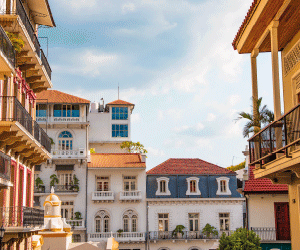Crowded Capitals? Unlock the Potential of Second-Tier Cities

Globalisation has long served as a catalyst for both mass tourism and business expansions, bridging the gap between the remotest locations. Large metropolitan cities have traditionally been the main targets for both leisure travellers and event organisers. It is estimated that the tourism industry generates more than $2.1tn in annual revenues and is the primary source of foreign exchange, employment and cash in many regions of the world.
But while bringing in significant investments and improving cities’ profiles, tourism also has its less pleasant effects. Cities become overburdened with tourists, which might go beyond the mere inconvenience. An influx of visitors can cause or exacerbate crowding, traffic congestion, increase prices and property rental costs, and disrupt normal community lifestyles. Moreover, it is evident that event organisation attracts even more visitors to a particular destination which can skyrocket already steep numbers of guests. For the event industry in particular mass tourism to first-tier cities brings about risks associated with safety and security, and creates additional planning and logistical challenges in ensuring that visitors have a smooth and enjoyable experience.
The emerging unsavoury trends of overstretching the city’s capacity to host its visitors risk becoming disruptive. One of such examples is a recent outbreak of anti-tourist marches across Europe, fuelled by local communities’ displeasure with ever-growing amounts of tourists. These demonstrations have erupted in first-gate cities, renowned for their economic, political, cultural, and aesthetic value. But this crisis can be transformed into an opportunity for event organisers to unfold the potential of second-tier cities and shoulder the burden carried by capital destinations. Second-tier cities refer to urban areas that are less known outside their national and regional context.
It has been observed that second-gate cities are buzzing hubs of economic activity, contain significant amounts of untapped potential for creativity, and might offer better local access to services. Moreover, they can become motors of the economic performance of their regions and promote territorial and social cohesion.
In the Netherlands one of the prime examples of an emerging destination is The Hague. A recent report revealeda spike in events booked to be hosted in this city, with an astounding 50 per cent increase in the number of international congresses organised in 2016 compared to previous years.
And it comes as no surprise – The Hague is simultaneously vibrant and stately, pulsating with energy and having a heart-warming feeling to its breath-taking vistas. The Hague is also home to the Dutch Government, the Dutch Parliament, and the Dutch Royal family - a testimony to its regal status.
The city’s multifaceted nature caters to different audiences with a diverse spectrum of interests. The Hague hosts over 160 international organisations employing around 14,000 people. Their missions vary from working on elimination of chemical weapons to assisting EU member states in their fight against international crimes and terrorism. The city is also home to numerous international courts, including the International Court of Justice, the principal judicial organ of the United Nations.
The Hague offers plenty of room for exploration. Its lively spirit invites for sightseeing and exploring such dazzling landmarks as Binnenhof, Peace Palace, Escher in the Palace, The Royal Theatre, or simply sauntering around one of the city’s magnificent parks. Most importantly, the city is spared of the abundance of tourists and prides itself on safety and friendliness – something that event organisers and participants cherish greatly.
Consider stepping off the beaten track of first-tier cities, and discovering and harnessing the potential of less known destinations – the benefits might be significantly higher than you expect. Second-gate cities offer an appealing package of smoothly run services, cultural perks, and reliable infrastructure which will make a long-lasting positive impression on both event organizers and guests.
For more information about The Hague Convention Bureau visit www.theconferencethehague.com
Contact The Hague Convention Bureau at at:
T: +31 70 3618888
E: info@theconferencethehague.com
Other Articles
About Us
Supported by the Union of International Associations (UIA), the International Association of Professional Congress Organisers (IAPCO) and the Interel Group, the global public affairs and association management consultancy, Headquarters Magazines serve the needs of international associations organising worldwide congresses.














